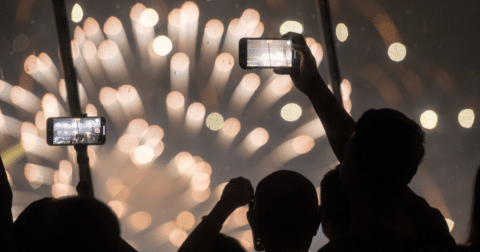News
GLP-1 Users Lose Weight, and Their Taste for Meat
Research•3 min read
Feature
There are ways to make the Fourth of July safer for pets, wildlife and farm animals.


Words by Jessica Scott-Reid
Fireworks displays have long been associated with celebratory moments. But Fourth of July fireworks have an impact on animals, including pets, wildlife and farm animals. Year after year, advocates for wild and domesticated animals implore the public to take precautions, and local governments to seek alternatives to celebrating with fireworks.
According to the Humane World for Animals organization, “both domestic and wild animals can find the thunderous sounds and flashing lights overwhelming and terrifying.” Companion animals can become extremely stressed and agitated, causing some to run away, becoming injured, lost or suffer detrimental health effects.
Around 20 percent of pets go missing after being scared of fireworks or similarly loud noises,” according to the American Society for the Prevention of Cruelty to Animals (ASPCA).
The Animal Legal Defense Fund adds that animal shelters and rescue groups across the country concur “that the days around the Fourth of July are the busiest that shelters face all year in terms of animal intake.”
Wildlife can be similarly panicked by fireworks, causing some to run into roadways or buildings, or fly too far away. “Birds can get disorientated,” states Humane World for Animals, “with research showing that fireworks can cause flocks of birds to take off for prolonged periods of time, expending crucial energy, and even fly so far out to sea that they are too exhausted to make the return flight.” Debris left over from fireworks can also cause problems for wildlife, “containing toxic material [it] can be mistakenly consumed by wildlife or even fed to their young.”
Wildlife rehabilitation centers are often reportedly “flooded with traumatized, injured and orphaned wild animals,” after events involving fireworks, according to the Humane World for Animals website.
Farm animals too can suffer injury or death when attempting to flee from the frightening sounds of fireworks. “There have been numerous reports of horses being fatally injured after being ‘spooked’ by fireworks,” says the Animal League Defense Fund. “Cows have even been known to stampede in response to the frightening sounds.”
Even animals held captive in zoos can be harmed when fireworks are shot off in the vicinity. A baby zebra reportedly died at a zoo in the UK in 2020, after running into the boundary of her enclosure, after being spooked by fireworks from nearby Guy Fawkes celebrations.
Keeping companion animals safe at home is one of the top tips from advocacy groups. “On the Fourth of July, and other days people are likely to set off fireworks, it’s best to leave your pets safely indoors, preferably with a radio or TV turned on to soften jarring noises,” recommends Humane World for America. “If you’re unable to leave your pet unattended at home, keep them leashed and under your direct control at all times.” The group also suggests seeking the help of a vet for those animals who experience severe stress and anxiety.
For wildlife, the U.S. Fish and Wildlife Service says to ensure fireworks are set off far away from habitats, especially waterways, and to pick up all resulting debris. “Keep in mind that consumer fireworks are banned in all national wildlife refuges, national forests and national parks,” it adds.
Many animal advocacy groups press on to have fireworks regulated or banned, and replaced with gentler alternatives. Humane World for Animals also suggests advocating for licensing and training of fireworks users, as well as lowering the decibel level of the loud explosives. “The current legal noise limit for fireworks sold to the public is 120 decibels, a similar level to a plane taking off! We’d like to see this reduced to 90 dB,” the group writes.
Animal lovers can “consider working with local officials to require the use of colorful ‘silent’ or ‘quiet’ fireworks for public celebrations,” Humane World for Animals has said. The organization adds that laser shows can be “evocative of fireworks,” without the harm and pollution. Drone displays are another option, the group has said, pointing to examples “like the one seen at the opening of the 2021 Tokyo Olympics.”
This post was originally published July 4, 2024.